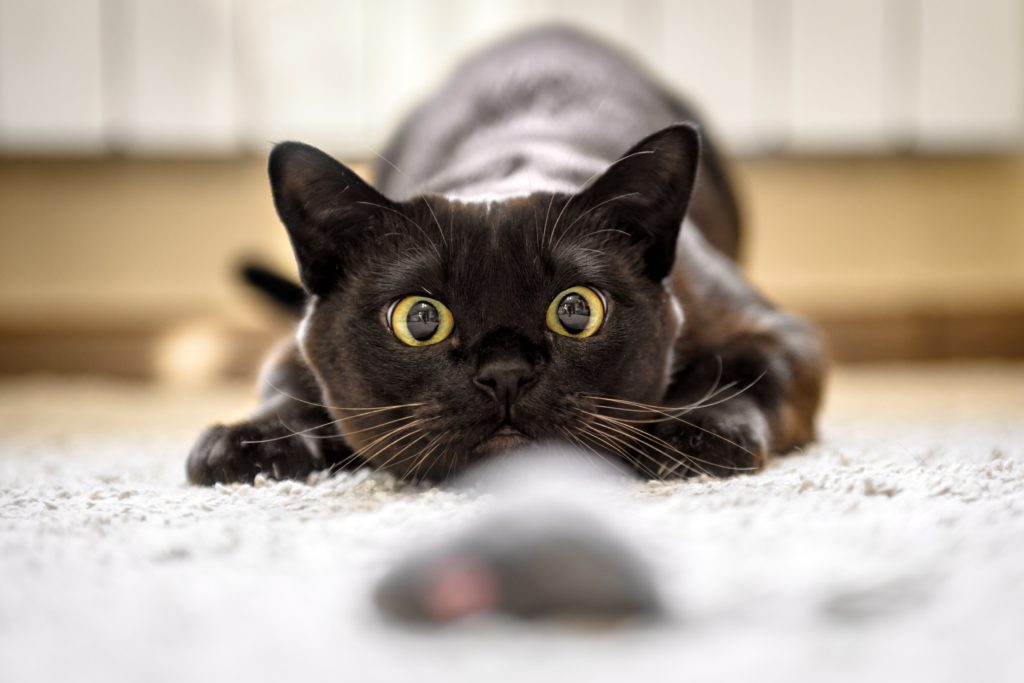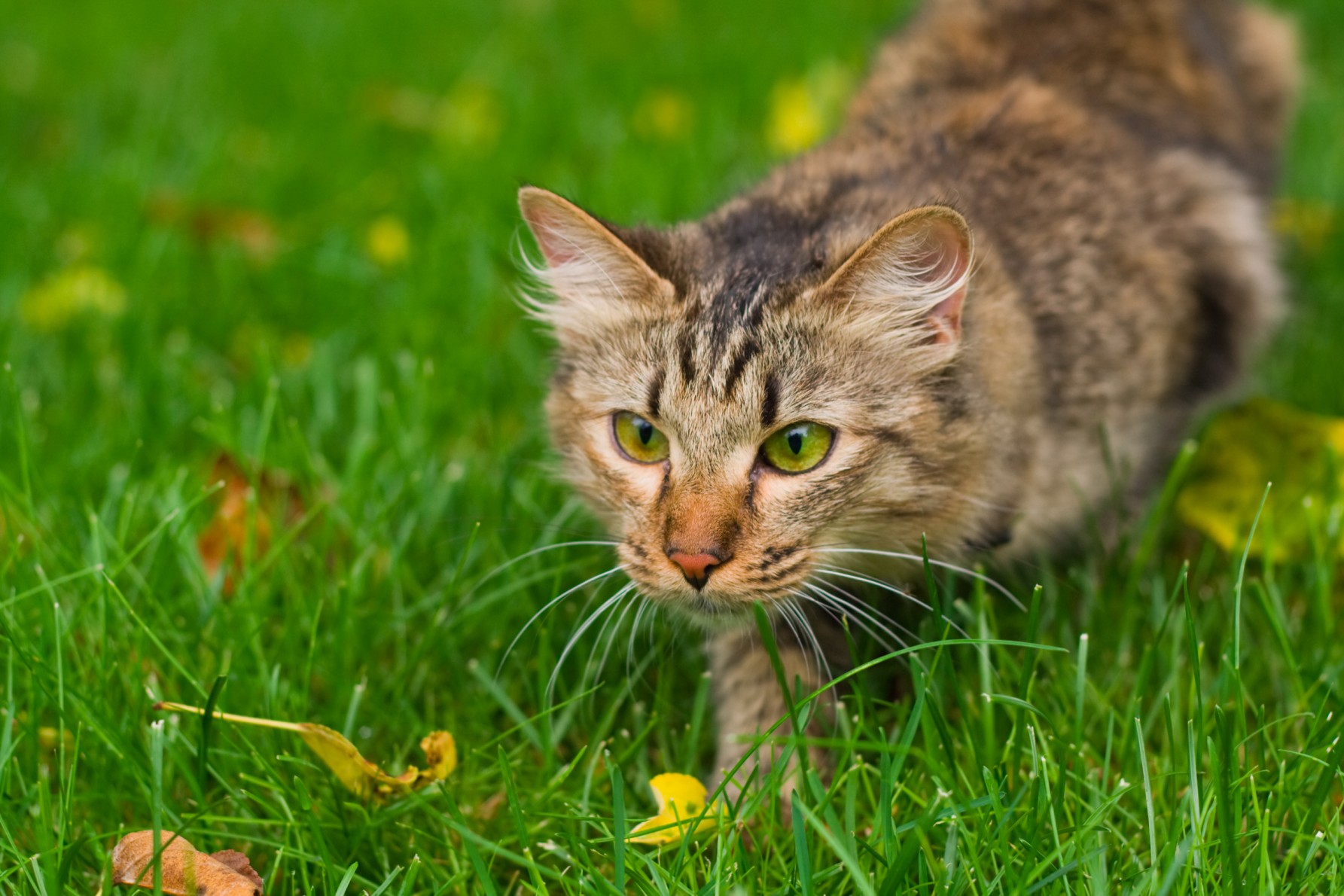Does your cat spend their time outdoors, hunting the local wildlife?
Are you fed up with birds, fish, mice, frogs and maybe even rabbits being brought inside, dead or alive by your pleased feline companion?
Do you put this down to your cat’s natural instinct and accept there’s nothing you can do?
You’re right that cats have a natural instinct to hunt prey however, that doesn’t mean you can’t reduce it.
Why does your cat hunt wildlife?
In a domestic environment, cats are usually well-fed and don’t need to catch prey to survive. However, the need to stalk and hunt prey is a natural instinct. Ambushing, stalking, hunting, fishing and killing prey helps your cat to fulfil a species’ need. This doesn’t just relate to the need for finding food, but for play, activity and stimulation. That’s why domestic cats will often kill prey and leave it uneaten, or bring it inside alive and play with it.
What and how much your cat likes to hunt prey will depend on various factors including, their temperament, surrounding environment and their experiences as a kitten.
What not to do to stop your cat hunting wildlife
Firstly, here’s what not to do. It’s best not to tell your cat off for catching and killing prey. As discussed above, it is a natural, normal feline behaviour, which helps fulfil their physical and mental species needs. If they bring it inside, it likely means they feel comfortable and safe at home. So, telling them off, shouting at them, or other punishment methods, could make them feel worried and that their home isn’t a safe space. It’s also unlikely to work. You can tell them off as much as you want, but it’s unlikely to stop their natural instinct, which is very powerful!
Keeping your cat indoors all the time without appropriate stimulation is not ideal either. The inability to carry out normal behaviours can cause stress, which can increase the likelihood of cat behavioural problems.
Increasing their food also isn’t advisable. They may eat more than they require and could put on weight. It won’t stop them from engaging in hunting-type activities when outside. Why? Because they’ll still want the stimulation.
What you can do to reduce your cat hunting wildlife
Thankfully, there’s a lot you can do to reduce incidences of your cat hunting prey outdoors, or to keep them indoors (preventing hunting) and also fulfil their important species needs.
Add a bell to their collar
Firstly, it’s worth looking into adding a bell to your cat’s collar. This can help alert prey to your cats presence. Research shows that bells and similar devices can work to reduce prey catches. However, if your cat struggles to keep a collar on, it may not be the right solution for you. It’s also important to ensure your cat is comfortable wearing a collar with a bell attached.
Increase activity, play and stimulation
Keeping them inside at times when prey are most active may help however, you should implement changes gradually and only if your cat seems happy with the change. Suddenly changing what they are used to may cause stress.
The best way to reduce your cat’s hunting adventures is to provide them with enrichment and stimulation to fulfil their natural species needs, without the prey! Find out more and listen to my experiences here.

Take note of their preferences
Take time to consider what and how your cat likes to hunt. For example, do they usually catch fur or feathers? Are they a fan of an ambush, or a stalk?
Then you can select appropriate toys to help mimic your cat’s natural preferences. Encouraging play multiple times a day will provide an outlet to keep them active and engage their brain to meet that natural need! Toys with a feather or mouse on the end of a stick can help encourage stalking, chasing and pouncing.
Use their food ration to encourage activity
You can also create stimulation with food puzzle games. For example, hide some dry food in a toilet roll tube. They will need to paw at it to get the food out. Keep it simple at first and build on the difficulty. If you make it too challenging, this may cause frustration and they might lose interest. Keep play short and sweet. It should mimic hunting, which tends to happen for a short time, multiple times a day. Using their food ration for small and frequent meals throughout the day with activities, rather than feeding from a bowl twice a day will help fill their day with stimulation and activity. We have a habit of feeding pets twice a day because it suits us, not necessarily our pets!
Remember to also feed a good quality, species appropriate diet. Ensuring your cat is nutritionally content will mean they don’t need to hunt wildlife for calories, or nutrients. It’s best to speak to your vet for dietary advice.
Safety
As long as safety is considered, you can use all sorts to create toys for example, cardboard boxes with treats hidden in them, or string with a feather attached to the end. Always ensure that your cat’s predatory play is directed at a toy and not hands, feet, legs or hair! If you’re worried that your cat’s play is unsafe, then contact a qualified cat behaviourist for guidance.
Enjoy the play
Ensure your cat receives a balanced diet and add lots of play and stimulation to their daily routine. This will mean they have less need to catch prey. It’s also a great way to bond with your cat!
Follow me on social media:

